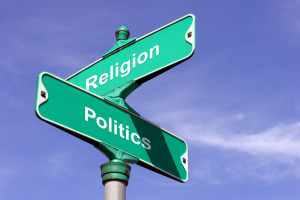Biola’s President, Dr. Barry Corey, on the university’s decision. Last week, two new Christian Universities, Grace College and Seminary (Indiana) and Biola University (the first California school to join the discussion) joined an existing lawsuit against the Obama administration’s Affordable Care Act, and the controversial requirements for employers of 15 or more employees to include contraceptive (including abortion inducing) tools and medication in its employee insurance coverage, free of charge to the employee.[1]
These two schools find themselves joining the likes of Wheaton College, Geneva College, Colorado Christian University, and Louisiana College in their efforts to utilize the courts to repeal the requirement for schools and other faith-based employers to provide contraceptives in their insurance plans, less they face steep government fines (estimates predict that Biola alone would face fines of $1.7M dollars should they fail to comply).
This decision brings several questions of popular discussion to the surface. There are countless opinions on many of these topics (as you can read in the comments section below any news article that covers this lawsuit or any like it). However, I would like to consider some of the issues involved in Grace and Biola’s decision, as well as the state of the scenario in general. Unlike some, I believe there are some pretty clear cut convictions informed by my understanding of Scripture that should result in action. And unlike others, on some matters, I think that many of us might most benefit from asking deeper questions, versus making quick conclusions.
Let me tackle some of these below, starting with some of the macro issues, and telescoping on down:
1) Is it the place of government to legislate morality?
Many might be surprised to hear that I find this to be a tough one. Clearly, the government does this (as it is the arm of justice with regards to morally reprehensible acts such as murder, rape, theft, etc). Yet, history has also showed us that the intrusion of government efforts to declare and enforce an legislated morality (especially declarations against things on which there is no biblical prohibition) has had a rough history of being successful- or acknowledged by the people. A prime example: the Prohibition movement, which ironically ushered in the inception of bootlegging and vast and violent networks of organized crime which to characterize the 1920’s).[2] Here, we learn several lessons: first, that that the political activism of a group with many pietistic Protestants to enforce non-biblical regulations resulted in great national harm. Secondly, as it did become the Eighteenth Amendment, we see that government efforts to govern types of morality proved to be fatalistic.
Conclusion: Moved by convictions such as Romans 13:4, I believe that the government does wield the sword to enforce justice, and justice does include taking action against immoralities such as murder, rape, stealing, etc. However, the government should not find itself excitedly trying to play in the legislative toy box to continually look for new items to declare legal or illegal. This is a line of great caution and care.
2) Does/should the government rightfully have the power to legislate what a private employer provides for insurance?
My perspective on lawful government (the topic requiring additional space and a topic for a later time) can’t find much room for justifying the government’s hand in these types of endeavors. Some argue that it’s necessary to prevent discrimination. If an employer chooses a benefit plan that includes contraceptives, and one doesn’t, how is this discrimination if every employee has the same coverage? What if one employer doesn’t provide any coverage for special intestinal issues, or perhaps they don’t include dental or eye insurance? Considering that every employee accepts their job, and its pay and benefits, freely and willfully, how is the employee being discriminated against? A truly free market allows the employer to control such decisions, and to make them as they wish to coincide with their beliefs, their desire to be a competitive employer, etc.
3) Also somewhat related is the issue of the relationship between the State and religious groups- specifically, whether it is appropriate or permissible to extend tax, participation, or other exceptions to religious organizations?
Based upon the deeply entrenched habits and precedent enjoyed within our country for 200+ years, where clergy and religious non-profits enjoy tax benefits and other special treatment, I believe many Christians would say we are absolutely entitled. But here I’m not so sure. And perhaps even more relevant- I’m not sure how spiritually healthy this policy is.
For the first few centuries of church history, the People of God found themselves often persecuted for their faith. And we aren’t talking heavy taxation and fines- we’re talking death. Nowhere in the Pauline or General Epistles, or in the teachings of Jesus, can I find imperatives or applications calling the church to take a stance to stand for their privileged freedoms in the political arena. Instead, I see commands to persevere these persecutions. I see encouragement towards longsuffering, and promises that the future has more to come. I’m in no way saying that their isn’t injustice in the governments use or abuse of their power in these situations. However, it seems the kingdom perspective is that fighting for these isn’t what matters- what matters is the church’s tight fisted clutch to the apostles teachings, to the preaching of the Life found in the Kingdom, and lives of living sacrifices, which speak and move in conformity to the image of Christ.
So, are Biola and Grace justified in their decisions to join the lawsuit? I don’t see why not- we are blessed to live in a country where the judges and jurists exist for this very reason. And I believe this is a far more appropriate use of the judicial system than many of the silly lawsuits that congest our courts every day.
However, what I feel where one risks error is in their attitude and the position of their heart with whatever action they take. If lawsuits are joined with an open handed “God, we trust you and accept the results, whatever they may be, and am prepared to keep my allegiance to you regardless of the outcome” mentality- this seems to embody walking in the spirit. If the actions are taken in a combative, mean-spirited, or entitlement-saturated mindset, a serious heart check is in need.[3]
4) Should faith based organizations be required to pay or to provide money in a way that would provide or empower someone to take a course of action that violates their doctrinal statement and religious beliefs?
Unless such religious practices involves the violation of natural law and clear biblical theology on the sanctity of human life (i.e. the murder or genocide of others), I would say no- they are entitled to their freedom in such decisions. But should the political or sociological environment decide that they must- the proper course is to continue in steadfast faith in these convictions, knowing that in their suffering, God might be more glorified.
[3] Although I do not have a magic ball to look into the heart of every person involved in these cases, I have every reason to believe that the convictions driving these universities’ actions are humble.





5 Comments
Leave your reply.